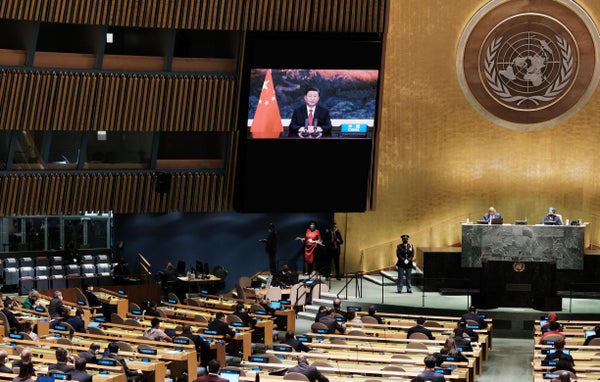China will stop building coal-fired power projects in other countries, President Xi Jinping said yesterday in an announcement that's expected to accelerate the global shift away from fossil fuels.
The pledge, made at the U.N. General Assembly in New York, comes as other industrialized nations are reversing economic policies that fueled the construction of coal plants outside of their borders, often in energy-deprived nations that are vulnerable to the effects of poverty and climate change. China's move shadows similar decisions by South Korea and top coal financiers in the Group of Seven (Climatewire, June 14).
Yesterday's announcement was short on important details, including when it will begin, but that didn't prevent Xi's statement from igniting optimism among observers.
On supporting science journalism
If you're enjoying this article, consider supporting our award-winning journalism by subscribing. By purchasing a subscription you are helping to ensure the future of impactful stories about the discoveries and ideas shaping our world today.
“An end to Chinese finance could facilitate the cancellation of over 40 gigawatts of pipeline projects in 20 countries — equivalent to the current coal fleet of Germany,” Belinda Schäpe, an EU-China climate diplomacy research at the E3G think tank, said in an email.
Yan Qin, a senior analyst at Refinitiv, said in a tweet that the announcement would send a strong message that China’s leadership is serious about fulfilling its pledge to “vigorously control” its emissions.
“Now that the world's major governments have led by example and banned overseas coal plants, it is time for the private sector … to follow suit,” said Kevin Gallagher, director of the Boston University Global Development Policy Center.
A study he co-authored found that more than 80 percent of global financing for coal projects came from private capital outside China.
China's announcement overshadowed strong statements by other world leaders at a General Assembly that was focused on stoking global urgency on climate change.
President Biden announced that the U.S. would quadruple its international climate finance to $11.4 billion by 2024 to help developing nations fend off the worst impacts of global warming.
“This will make the United States a leader in public climate finance,” he said.
If Biden can deliver on his pledge, it will likely make the U.S. the world's single biggest contributor to climate projects, said Joe Thwaites, a global climate finance expert at the World Resources Institute.
However, many other countries, especially in Europe, are contributing a larger share of their gross domestic product, he said.
Nevertheless, world leaders and climate groups welcomed the United States' renewed role on the global stage ahead of a U.N. climate summit in Glasgow, Scotland, this fall.
“The UK and the US are leading the fight to protect our planet — this is exactly the momentum we need ahead of @COP26,” British Prime Minister Boris Johnson said in a tweet.
U.N. Secretary-General António Guterres said he was encouraged by the announcements from China and the U.S., the world’s largest economies and climate polluters.
But, he added, the world still has a long way to go to address the climate crisis.
“We are weeks away from the U.N. climate conference in Glasgow, but seemingly light years away from reaching our targets,” Guterres said in his opening statement. “We must get serious. And we must act fast."
Saleemul Huq, director of the International Centre for Climate Change and Development in Bangladesh, said he hoped the U.S. pledge would spur other countries to enhance their commitments. Developed nations promised a decade ago to offer $100 billion a year to poor countries for climate finance. That goal was never reached.
The world’s most vulnerable countries want to know how much of Biden's pledge can be used for adaptation projects, Huq said.
“We want at least half the amount to go toward adaptation, but the track record is very poor,” he said.
Less than a quarter of current climate funding goes toward adaptation, or roughly $16.7 billion a year. But adaptation costs for developing countries amount to around $70 billion annually and are projected to rise to as much as $300 billion by 2030, according to the U.N. Environment Programme’s adaptation gap report.
Guterres echoed the call for more adaptation financing while urging countries to end fossil fuel subsidies and stop building coal plants immediately.
If all planned coal plants become operational, he said, “the Paris targets will go up in smoke.”
It's unclear if China’s pledge to end coal financing abroad only applies to public finance, or if it also covers state-owned or commercial banks. Data from the Global Energy Monitor’s coal plant tracker showed that more than half of coal projects in the pipeline in 10 countries are supported by China.
Xi used his address to the U.N. last year to announce a goal of peaking carbon dioxide emissions by 2030 and achieving carbon neutrality by 2060. Yesterday, he said China would strive to meet those goals ahead of time and announced that it will step up support for green and low-carbon energy in developing countries.
Reprinted from E&E News with permission from POLITICO, LLC. Copyright 2021. E&E News provides essential news for energy and environment professionals.
